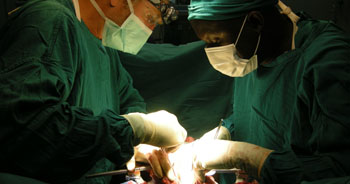WHO Issues New Guidelines to Reduce Surgical Infections
By Daniel Beris
Posted on 01 Dec 2016
The World Health Organization (WHO; Geneva, Switzerland) has released new global guidelines covering surgical site infection (SSI), with a view to reduce costs and infection-related patient complications.Posted on 01 Dec 2016
The WHO "Global Guidelines for the Prevention of Surgical Site Infection" includes a list of 29 concrete recommendations distilled by 20 of the world’s leading experts from 26 reviews of the latest evidence. Included are 13 recommendations for the period before surgery, and 16 for preventing infections during and after surgery. They range from simple precautions, such as ensuring that patients bath or shower (but not shave) before surgery, to instructions for surgical team hand hygiene compliance, what disinfectants to use before incision, and which sutures to use.

Image
The guidelines complement the WHO “Surgical Safety Checklist”, which gives a broad range of safety measures. Importantly, the guidelines recommend that antibiotics be used to prevent infections before and during surgery only, and not after, a crucial measure in stopping the spread of antibiotic resistance, which leads to longer hospital stays, higher medical costs, and increased mortality. The recommendations were published on November 3, 2016, in The Lancet Infectious Diseases.
“No one should get sick while seeking or receiving care,” said Marie-Paule Kieny, MD, assistant director-general for health systems and innovation at the WHO. “Preventing surgical infections has never been more important, but it is complex and requires a range of preventive measures. These guidelines are an invaluable tool for protecting patients.”
“Sooner or later many of us will need surgery, but none of us wants to pick up an infection on the operating table,” said Ed Kelley, MD, director of the WHO department of service delivery and safety. “By applying these new guidelines surgical teams can reduce harm, improve quality of life, and do their bit to stop the spread of antibiotic resistance. We also recommend that patients preparing for surgery ask their surgeon whether they are following WHO’s advice.”
SSI’s are an important contributor, and may even be the most frequent healthcare-associated infection (HAI) after asymptomatic bacteriuria, representing a high burden on patients and hospitals in terms of morbidity, mortality, prolonged length of hospital stay, and additional costs. Researchers have been searching for decades for the optimal bowel preparation, but failed to address biological factors. Today, however, genome sequencing and microbiome studies have open up new areas for study that might give biological insight into what works best and for which patients.
Related Links:
World Health Organization














.jpg)